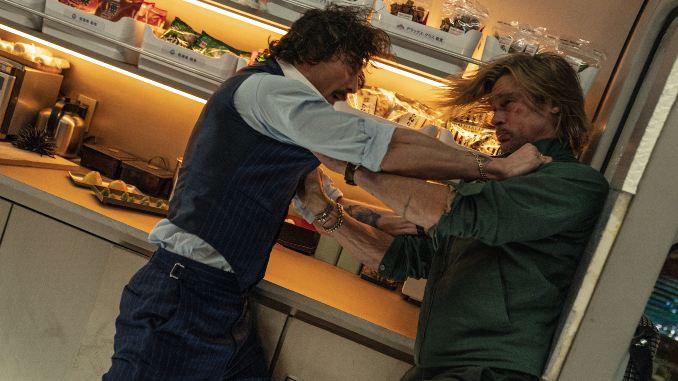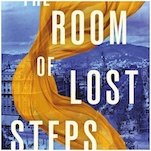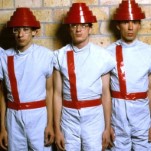Bullet Train Is a Fun Action Ride That Barely Leaves the Station

What can I say about Bullet Train? Well, Hiroyuki Sanada is in it as a sage old warrior. Despite being based on a novel by Japanese author Kōtarō Isaka (MariaBeetle, which won the University Reader Award in 2010 and was translated to English by Sam Malissa in 2021 under the name Bullet Train), Sanada’s presence feels like an analogy for the film’s relationship with Japanese culture. Sanada was the samurai that bullied and trained Tom Cruise in The Last Samurai. He’s Scorpion in the most recent Mortal Kombat. He’s the Yakuza that Hawkeye kills in his global quest for justice (read: murdering non-white criminals) in Avengers: Endgame. He’s opposite Hugh Jackman in The Wolverine. Where on that iffy continuum of American films engaging with Japanese culture does Bullet Train fall? It’s a surprisingly complex question when asked of a film that is at times too clever, but lacks depth or innovation, unlike a real bullet train. A lack of innovation in and of itself isn’t a failure if the execution is spectacular, but Bullet Train uses a familiar tale of murderers clashing along intersecting storylines centered on a couple of objects to demonstrate another familiar tale: Plenty of flash and too little substance.
The film is oriented around Ladybug’s (Brad Pitt) first job back as a hitman after some therapy. While attempting to retrieve a briefcase on a train from Tokyo to Kyoto, he runs into several other assassins on missions that pit them all against each other. This leads to punches, shootings, stabbings and general confusion around humorous but deadly violence.
The first films that came to mind watching Bullet Train were Lucky Number Slevin and Way of the Gun, movies about killers meeting violently at cross purposes. But it’s not as self-serious or self-important as either. And it’ll probably age better because it isn’t homophobic or violently misogynistic, though a lot of its jokes are very much of 2022. So, it’s closer to a time-capsule than being timeless.
Bullet Train is not as visually experimental as Kill Bill, but that might be a closer analogy—it’s all assassins with codenames and gimmicks against a colorful, shifting backdrop. It also reminds me of James Gunn’s The Suicide Squad, albeit less obnoxious. And in lieu of a kaiju starfish, we have the central vehicle running off track, with effects done creatively and realistically enough to almost pass for a real stunt, or at least substitute for one in a way that conveyed risk and danger.
Good actors elevate okay dialogue in a decent script; it’s knowing enough to grate on some people but mostly left me wanting for edge. Still, while movies with too many quips lead to the characters sounding like they have the same voice, the shticks here keep the characters distinct beyond race and nationality—which still figure into the film, but not in ways that are pandering on one hand or particularly interesting on the other. Despite the betrayal which comes from an oversaturation of advertising, the performances land. Brad Pitt’s Ladybug, the hitman out of retirement pursuing inner peace, comes off as annoying in his attempts to be wise, but is written as dumb enough to not be overwhelmingly arrogant. Brian Tyree Henry and Aaron Taylor-Johnson as Lemon and Tangerine have good chemistry; Benito A. Martinez Ocasio (AKA Bad Bunny) has a nice flourish in his brief appearance as Wolf (like Zazie Beetz’s Hornet, I wish he were in the film longer). Joey King is called Prince here and is a dynamic catalyst—she makes things happen through a good expression of a somewhat obvious disguise. And Michael Shannon plays White Death, the big bad, a Russian who took over a Yakuza family by killing the Minegishi family…the Yakuza family in the novel.
His appearance informs the global nature of the cast of assassins within the plot’s context, therefore enabling the diversified cast. I generally encourage that sort of thing, but it’s noteworthy that in this case it’s taking a Japanese story and making it less Japanese. That‘s a missed opportunity for the American filmmakers and audience. Take movies like Neptune Frost or Karmalink. Despite Americans involved in the production, they tell you something about the places where they’re set; they’re configured around the material conditions and cultures they’re depicting. Even The Takedown, which feels a lot like an American action blockbuster, draws on specifics of French culture and politics from Paris to the provinces.
-

-

-

-

-

-

-

-

-

-

-

-

-

-

-

-

-

-

-

-

-

-

-

-

-

-

-

-

-

-

-

-

-

-

-

-

-

-

-

-








































